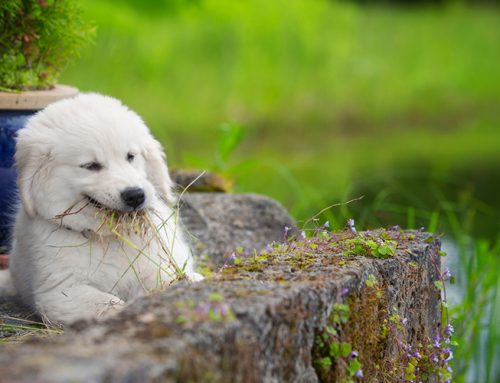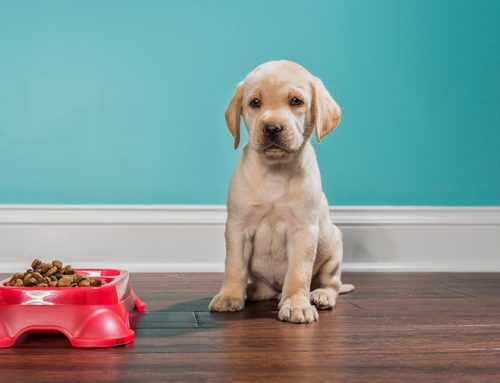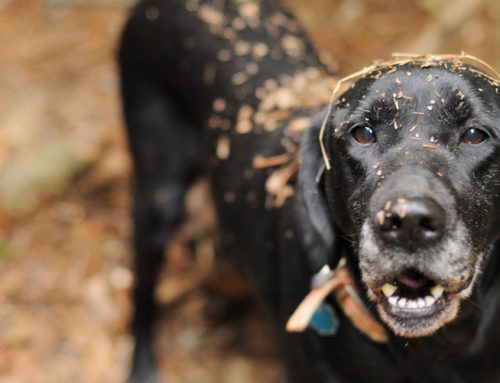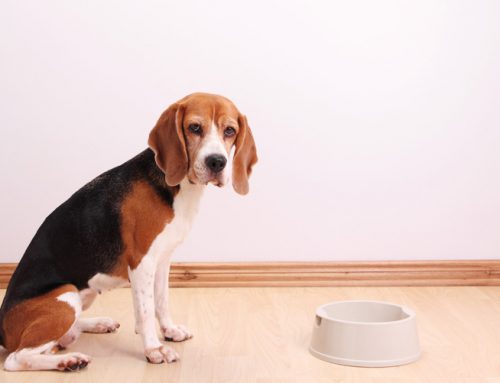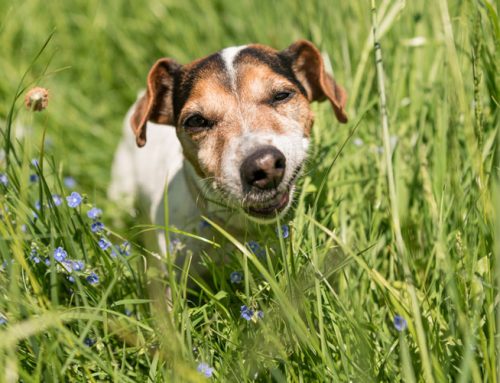My Senior Dog is Eating Poop — Why? What Should I do?
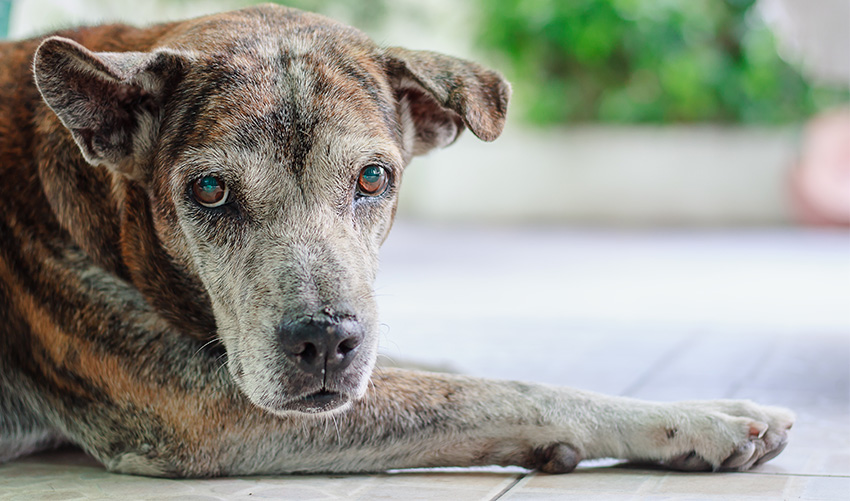
Poop happens. Sometimes dogs do their business — then they eat their business. Or the cat’s business. Or. Well. You get the idea.
Dogs of any age may start eating poop (and not just their own), which is a condition called coprophagia. If it’s a sudden new behavior, a trip to the vet is in order to discuss possible causes and to make sure your dog is healthy and happy. Some senior dogs may have specific medical reasons they’ve turned to eating stool.
The American Kennel Club (AKC) reports that 16 percent of dogs are considered “serious” stool eaters — meaning they were caught eating poop five times or more. The information comes from a 2012 study presented at the American Veterinary Society of Animal Behavioral conference.
Why eat poop? Especially if your dog gets plenty of filling meals in the sanctioned doggie bowl?
Maternal Instinct or Puppy Habits
Mother dogs lick their puppies clean and this includes feces. They also eat their babies poop to keep the den tidy or to hide their presence from predators. It’s normal — sometimes pups mimic the behavior and learn to eat feces. Most outgrow it, while others keep it up.
Puppies may eat poop as they investigate the world around them. Eventually, most puppies stop this behavior as they become used to their environment or they get trained to leave the poop alone.
It’s Tasty
Not to humans, of course, it’s almost unfathomable to think dogs enjoy the taste. Apparently, dogs think cat poop is delicious. The Spruce Pets theorizes this is because cats have high protein (meat) diets.
In the Live Science article, Don’t Poo-Poo This: Why Dogs Feast on Feces, writer Mindy Weisberger reports that a recent survey of 3,000 dog owners in the United States and Canada found that 82 percent of the poo-eating dogs only ate stool that was less than two days old. Fresh and firm are best.
There are ways to make it less tasty. A VCA Hospitals article titled Dog Behavior Problems – Coprophagia, reports that dogs seem to prefer to eat “well-formed” stool, and stools with added digestive enzymes may result in a less yummy stool.
“Cat feces and those of some other animals often have enough appealing attributes (odor, texture, and taste), to overcome the fact that they are fecal waste. Dogs that eat the feces of herbivores may be attracted to the digested vegetation.”
It’s Anxiety Soothing
Senior dogs may suffer from higher anxiety as their vision or hearing fails. They also are more at risk for cognitive impairment, which is anxiety-inducing. Poop eating can be self-soothing.
Dog rationale is complicated — a dog that is scolded for eating poop or pooping in the house (senior dogs are also more likely to have accidents in the house), may eat the poop to avoid getting in trouble. Poof. Evidence gone. Anxiety soothed. From a dog’s perspective, it’s a win-win.
Vet Wailani Sung writes that possible sources of anxiety that can cause coprophagia are: general anxiety, anxiety about being confined, separation anxiety, and boredom while confined in a crate or a room.
A dog that gets attention, even negative attention, for eating poop might continue the behavior.
The Dog is Food-Obsessed
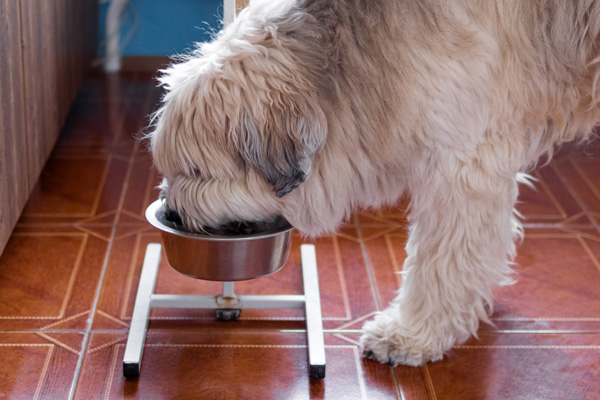
Some dogs are significantly more food motivated than others. They may already eat weird things like bugs, or random leaves off the ground, or bits of grass. And if the poop tastes good — why not eat it?
Alternately, if your dog is fed outside, or in an area it also poops in, it may associate the scent of food with poop and not be able to determine that they are different substances.
Of course, your dog may simply be hungry. If your dog is an ideal weight or underweight, you can try feeding him or her extra food for a few meals and see if that alters the behavior. It’s possible your dog was simply looking for a few extra calories to get through the day.
Boredom, Loneliness, and Submission can be Factors
Caring for a Senior Dog suggests that in multi-dog households, submissive dogs might eat the poop of the more dominant ones. The AKC also reports that coprophagia is more common in homes with more than one dog.
Dogs do seemingly bizarre things when they’re bored, lonely, frustrated, or need more exercise. If a dog has nothing to do and no one to play with, it might resort to eating poop, although the why may remain unclear to humans. Tiring out a dog physically and mentally can help support all sorts of good behavior.
PetMD reports that some puppies start eating poop when they’re young. You may notice your puppy put poop in its mouth and tell them to drop it or run at them to get the stool out of the dog’s mouth. Some puppies will never pick up poop again — others will think they’ve found a new way to get you to play with them. Suddenly, “poop chase” is their new favorite activity.
Your Dog Needs More Nutrients
If your dog is lacking in vitamins or minerals, it could be trying to instinctively source the nutrients from its feces, or from another animal’s poop. There are medical reasons your dog may not be getting enough mineral and vitamin absorption from its food and turn to poop as a possible source.
“For poop-seeking pups, fecal freshness is a factor,” according to Live Science. “The behavior … is generally viewed as a second chance for an animal to extract nutrients from its diet. Domestic dogs, which can also be avid eaters of poop, have been found to turn to poop eating due to nutritional deficiencies in their diets caused by starvation or disease, prior research has suggested.”
The AKC suggests that a vitamin-B deficiency may be a cause of poop eating. Rabbit poop is full of B vitamins and both bunnies and dogs will sometimes eat rabbit poop.
Your Dog has a Medical Condition
“Any medical problem that leads to a decrease in the absorption of nutrients, causes gastrointestinal upset or causes an increase in the appeal of the dog’s stool, could lead to coprophagia,” write vets Debra Horwitz and Gary Landsberg for VCA Hospitals. “Feeding a poorly digestible diet, underfeeding, and medical conditions that decrease absorption such as digestive enzyme deficiencies or parasites, could lead to malnutrition or vitamin and mineral deficiencies, and therefore an increased appetite and possibly stool eating.”
If your dog’s digestive system isn’t working as well as it should, there might be undigested food in the stool, which makes it extra compelling — to a dog anyway. It’s best to treat the underlying medical condition that is causing your pet’s digestive system to underperform.
“A change in diet to one that’s more digestible, or one with different protein sources may be useful,” Horwitz and Landsberg suggest. “Some dogs may be improved by adding enzyme supplements to improve nutrient digestion or absorption.”
As senior dogs are more prone to medical conditions, a health concern may be what causes an older dog to eat stool.
“Coprophagy can be associated with disease of the intestinal tract and sometimes other parts of the body (liver, brain, etc.)”, writes Sung on PetMD.
Conditions that may influence poop eating tendencies are malabsorption issues, diabetes, Cushing’s’, thyroid disease, pancreatic insufficiency, intestinal parasites, and even prescribed drugs like steroids. Steroids or thyroid problems may increase your dog’s appetite.
Diagnostic tests will likely need to be run to rule out or determine what medical issues your dog might be having.
What are the Health Risks of Eating Poop?
The biggest health risk is picking up a parasite (or the eggs of a parasite), especially if your dog eats poop that wasn’t his or hers to begin with.
Consuming bacteria is also a risk. If your dog starts to develop upset tummy symptoms (burping, gas, vomit, lethargy) you may need to have it tested or treated at the vet. Animal stool can also be contaminated with toxins or viruses.
Bacteria and parasites from stool can also be transmitted to humans, so if your dog is a poop eater, make sure he doesn’t give you a big wet lick after he’s eaten an unfortunate snack.
Bad breath is also an inevitable outcome.
How do I Prevent my Senior Dog from Eating Poop?
If your dog stays mostly in your yard, pick up after it every time it does its business so there’s nothing left behind. Redirect the dog’s attention right after it poops with a treat or beloved toy.
Add pineapple to your dog’s regular food — some dog owners claim this makes poop taste unappealing to dogs.
Stay vigilant when you’re walking, and distract your dog with a treat or a change in direction, away from piles of poop left behind.
If you have a cat with a litter box, keep it out of reach from your dog, or clean it regularly.
If your dog spends a lot of time alone and isn’t getting enough mental stimulation, make a point of tiring out its brain so it doesn’t have time to get bored and decide a snack is in order. There are great treat-dispensing toys on the market that require the dog to push it or perform other steps to get a delicious and nutritious treat. Exercise, if your senior dog is up for it, may also help.
Practice the command “leave it” so that when your dog encounters a pile of poop, it responds to your order rather than its usual behavior. Reward your dog if it listens and leaves the poop alone!
Lure your dog away from piles with an extra special treat that he or she wants more than the poop.
Try a supplemental product designed to make poop taste bad. Talk to your breeder, local rescue, or vet to determine what product might work best for your dog.
Work with your vet to rule out any serious medical conditions or nutrition gaps.

